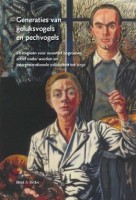Bonus Chapter 2016 – 2 ~ Frequently Asked Questions About Distance Workers
No comments yetIntroduction
It may seem slightly absurd, but most questions about distance workers have a history already. These questions have come forward with regard to the pattern of generations, in particular its dynamics and its structure. In bonus-chapter 2016-1, already a number of major developments related to distance workers have been discussed, focusing on their past and future. In this bonus-chapter we will deal with four sets of FAQ’s.
First: are distance workers a new phenomenon or have distance workers a long history already?
Second: what is the impact of major events in society on cohorts, in particular cohorts of distance workers?
Third: which strategies have an impact upon distance workers?
Fourth: what is the impact of the analysis of distance workers on the sociology of generations?
The history of distance workers
Which early examples demand our attention? Instructions by letter have been launched frequently in the past.
Which examples in the recent past are at stake? Each time an innovation in systems of communication has occurred this innovation has changed the roles of distance workers. Take the emergence of internet and video conferencing.
Is an example available? Take the course presented by video conference from Utrecht to South-Africa described in the previous bonus-chapter. This video conference took place twenty years ago.
Distance workers can get engaged in more than one occupation. For instance they can act as a financial expert and combine this occupation with teaching or coaching.
The impact of major events on behavior in cohorts
How does a new generation emerge in society? A new generation in society comes into existence as soon as a major event has taken place. Or a set of interrelated events has occured.
As soon as a new generation has emerged, it moves on in time. Compare this with processes in the body of a Python that has swallowed a rabbit. Slowly the rabbit moves on in the body of the snake. The body of the rabbit slinks. After some time another rabbit will be swallowed.
Which major events have occurred recently that have triggered the emergence of a new generation? For an answer to this question we have to look at cohorts whose members have experienced in their formative period the drastic rise of ICT. We are looking at cohorts that have been born approximately after 1985. New innovations in ICT result in changes in the pattern of generations. In the book ‘Generations of Lucky Devils and Unlucky Dogs’ statistics showing the development of intelligence and memory capacity during the formative period have been presented.
The impact of the pattern of generations on behavior in cohorts.
Which impacts on the stream of economic refugees have to be taken into consideration? In the stream of economic refugees young males dominate. If a developed country wants to admit members of this category, it is free to do so. If a developing country wants to avoid the immigration of a member of this category, the country can refuse admittance and advise the economic refugee to return to the developing country and take the role of a distance worker. Availability of this role provides the country refusing admittance moral arguments for the refusal.
Which impacts on the stream of political refugees have to be taken into consideration? International rules oblige a developing country to admit refugees that come from a discriminating country. However, these rules permit the developed country to send a political refugee to another developed country. For example to Turkey, which country has been promised by the European Union 3 milliard Euro for financing this kind of hospitality. Turkey does not permit political refugees to participate in its labor force. It is to be expected that Turkey will organize its hospitality in a restricted sense. As a consequence, these political refugees will try to return to their home country as soon as possible. Also, other countries like Turkey will come forward to offers political refugees a protected area. In politically discriminating countries, protected urban areas will be organized. Also, protected rural areas will be created, although this is less easy. Organizing protected areas is supported by the availability of surveillance cameras, drones etc.
The Impact of the analysis of distance workers on the sociology of generations.
Why is the sociology of generations interested in the analysis of distance work? In 2016 and in the fifteen years to follow relatively large cohorts of citizens aged 65 years and over will expect a pension and a lot of facilities. These pensions and these facilities will have to be financed by members of generations born after about 1985. This potential crash of generations will trigger strategies to avoid or mitigate conflicts. The sociology of generations will be invited to develop the strategies that are required. For example: how could individuals ages 65 and older be stimulated to remain active in the labour force? How will the role of distance worker contribute to this strategy?
This bonus-chapter has been published on January 16, 2016. Bonus-chapters providing FAQs will be supplemented on a regular basis.
You May Also Like
Comments
Leave a Reply










